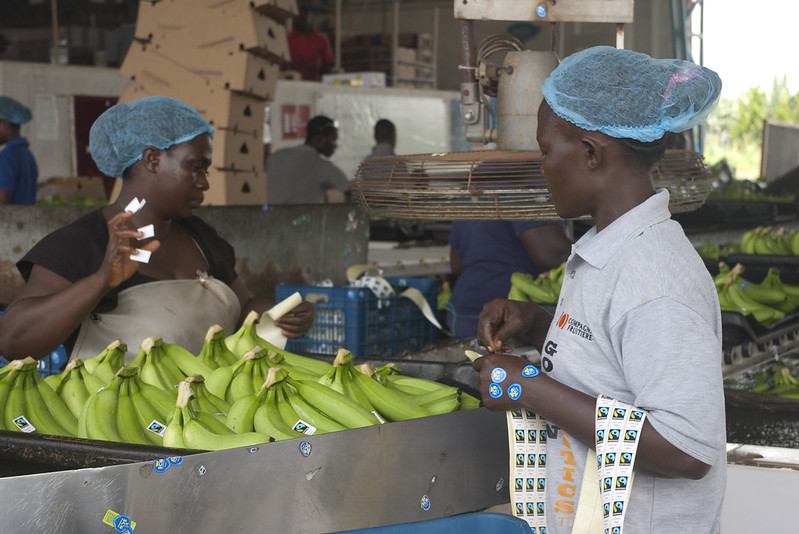UK Retailers Pool Fairtrade Sourcing Commitments to Implement Change
The Fairtrade Foundation was given the green light to push ahead with a shared-responsibility initiative designed to tackle human rights and environmental challenges in tropical supply chains last November, when informal guidance issued by the UK’s Competition and Markets Authority (CMA) confirmed that the initiative was unlikely to be in contravention of competition law. Known as the ‘Shared Impact Initiative’, it is set to bolster retailer efforts to tackle supply chain risks in coffee, cocoa and bananas. A year-long pilot phase of the scheme in Colombia, Ghana, Kenya and Côte d’Ivoire is due to start imminently, and will be followed by the signing of three-to-five-year contracts on the part of five UK retailers.
The scheme is intended to both guarantee and increase the sales of Fairtrade certified produce on participating farms as retailers make long-term, pooled sourcing commitments, building closer relationships with suppliers and gaining clearer insight to the challenges they face. While the CMA informal guidance is centred on environmental sustainability and climate change adaptations, the potential of the initiative to have broader social impacts is recognised. The crux of scheme is that by providing producers with guaranteed sales and the associated financial security that comes with longer contracts, an enabling environment is created for investments into social and environmental sustainability. The UK’s two leading retail brands, Tesco and Sainsbury’s, are understood to be among the five retailers poised to participate in the scheme.
Tackling Structural Issues in Banana Supply Chains
According to Fairtrade Foundation associate director for responsible business, Anna Mann, the initiative is conceived to tackle some of the underlying root causes of the negative social and environmental impacts of trade. Fragmented and opaque supply chains, a lack of long-term investment and fluctuating sales have limited the scope of producers to invest in climate change adaptations, sustainability or improved wages and working conditions. And while Fairtrade certification guarantees a minimum price and a workers’ premium, producers may be able to sell only a small proportion of their produce as Fairtrade certified, limiting the positive impact that certification can have on a farm.
In early 2023, UK retailers committed to implementing living wages in their banana supply chains by 2027, with parallel commitments already established in Germany, Belgium and the Netherlands. Over the last year, industry debate has centred on the most effective means of ensuring that workers are paid a living wage. Projects that piloted worker engagement in wage data verification returned positive results, and retailers across the four countries with living wage commitments have publicly recognised the role that unions can play in salary negotiation, affirming that “Collective bargaining is the most sustainable approach to wage improvement” in a statement released in February.
According to Mann, the Shared Impact Initiative will support the key role of unions in bargaining for wages. By giving farm and plantation management the long-term financial security that the 3-5-year contracts offer, they can better predict sales volumes and prices, enabling them in turn to engage in meaningful negotiations with unions around wages. In the banana industry, labour costs can account for almost half of the total costs of production, so the implementation of responsible sourcing practices that include long-term contracts as well as increased purchasing prices is crucial to ensure worker salaries can be improved. For Fairtrade, this is the route that will allow certified farms to move away from a system where worker incomes are boosted up to living wage levels though the payment of bonuses from the worker premium, an approach that was always intended to be temporary, she says.

The Bottom Line is Price
This week’s publicity around Fairtrade’s Shared Impact Initiative coincides with renewed calls from Latin American and Caribbean banana producers (see below) for the adoption of the Fairtrade methodology across the European industry in order to calculate a fair price that considers environmental sustainability efforts and fair wages. Referring to decisions by German retailer Kaufland’s controversial move to sell bananas at E0.88 per kilo in April and Italian retailer Eurospin’s announcement of an E0.85 per kilo price in May, the producers criticised a lack of progress on the root causes of sustainability issues – in their view a combination of low prices and a lack of shared responsibility on the part of retailers. The statement went on to criticise the development of sustainability tools and schemes that lacked producer engagement, did nothing to solve the underlying issues, and demonstrated a lack of knowledge about producing countries’ internal mechanisms for achieving a living wage, such as collective bargaining or public policy and legislation.
While there has been no suggestion yet that European retailers are on the brink of universally adopting the Fairtrade pricing methodology, Mann is clear that the Shared Impact Initiative is aimed at increasing the volume of Fairtrade certified produce they source overall, rather than retailers moving volumes of Fairtrade sourced bananas around. This means that more bananas would be bought at the Fairtrade minimum price across the industry: welcome news after the announcement of a two-year moratorium on new certification earlier this year, a decision that was apparently taken in the context of market saturation for Fairtrade bananas, and in order to protect the sales volumes of existing certified farms and cooperatives.
And while the initiative is currently focussing on only three banana producing countries, and one European retailer group, Mann hopes that the initiative will be to encompass other groups of retailers across Europe and beyond, in turn allowing for the incorporation of other producing countries and the development of much bigger buying pools that can increase the impact. As Mann states, ‘We want this to be inclusive of every banana producing origin where Fairtrade works: we don’t work in an origin where there are no problems, or profound challenges, or risks posed by climate change. The initiative would be meaningful to every group that we work with so our aim is to build the market demand, scale up the volumes and increase the number of producer groups involved.’
